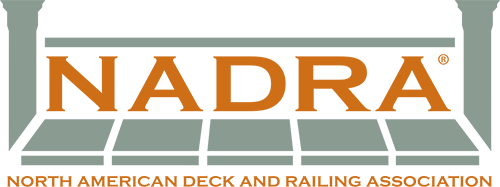By: Glenn Mathewson
Let’s avoid the discussion about “why” building departments are closing, reducing services, or not doing certain inspections. For virus advice, please head to the CDC or your local health department. In this article, let’s use our First Amendment right and discuss ideas for deck builders that need and choose to keep working, but don’t know how. These ideas are not for normal times. They are for times when out-of-the-box thinking is required, and norms must be challenged.
Our nation’s building authorities do so much to protect our communities, but if you consider humanity’s timeline of acquiring, maintaining, and improving “shelter”, a building department is a modern convenience. There were owners, designers, tradespeople, contractors, suppliers, and even utility service providers involved with construction long before there were permits and inspectors. Do you still stop at a red light even when officers are not around? Most of us do. Can you still comply with code even when the inspector is not around? Yes, but it’s probably going to take more effort. There will be greater risk in absence of their help. Like a red-light traffic camera, if you don’t follow the rules now, you will have to address it later. So how do you fill in temporarily for the building department, if any hope of their assistance is gone?
Inspections
Government inspections need no justification of their importance. They keep professionals honest, they reveal the nuances of the local construction standards, and they offer a sense of protection to the general public. A temporary delay of inspections creates a time gap where mistakes can go uncorrected. Inspection delays happen when unusual events occur and create more work than can be handled, such as roof inspections after a major hailstorm. At these times, 3rd party, private inspectors are often approved by the jurisdiction at the cost of the contractor. Many building departments already are providing guidance for using 3rd party inspectors and more are likely to follow. Engineers, architects, and home inspectors could all provide this service, IF they are knowledgeable and experienced in current codes. Larger urban areas likely have code consulting firms able to offer inspections. The problem may be the same though, as you have to get them to leave their home. If deck builders are left to fend for themselves, they will have to get creative.
- The Self Inspection: When it’s time for an inspection, come back the next morning or after lunch with a different hat on. Go through the whole deck like you’ve never seen it before and write a correction list. Don’t fix anything until you’re done playing inspector. Have everyone on the crew do this and compare your inspection reports.
- The Crew Inspection: For builders with multiple crews, consider having the leads of different crews inspect each other’s work. It may be hard to get subcontractors to play nice together, but that was so 2019.
- The Competitor Inspection: Have you been friendly in your industry? Maybe made friends with other NADRA members? Nothing sounds crazy anymore, so maybe exchange a game of “play inspector” with them.
Code Compliance
A lack of code education is the single greatest cause of code violations and not even inspectors are immune. The catch is that even if you know the IRC cover to cover, you still aren’t ready to play inspector. You’ve got to know the locally adopted and likely amended code. Those that continue to build, have a greater duty than ever to build correctly…but that’s not defined in the IRC, it’s defined by each authority. The plan review process usually reveals any local requirements and it allows mistakes to be corrected easily and on paper. If the chaos continues and you’ve got to start a new project, you still need to do a plan review. Using the same advice provided for inspections, create the best, most detailed set of plans you can, and have someone else do a plan review. Here are some suggestions if you find yourself in that situation.
- Review similar past projects and any red lines on plans or revision letters. Look over the inspection reports from the same jurisdiction.
- Go online to the building department website and look at their code adoptions and amendments. Review any guides or handouts they have provided. You may not realize how much assistance has been there all along to help you succeed.
- Look at the planning and zoning requirements for setbacks, maximum and minimum required areas, and even material types that may be regulated in ordinances and can differ from neighborhood to neighborhood. Common conditions that trigger unique rules include decks close to property lines, visible from public ways, built with unique materials, at multi-family buildings, or serving a front door.
- Unusual designs and alternative products and materials may be something to avoid right now, as they get more inconsistent approval amongst building authorities. Now is a good time to stick to what is easy, proven, and has been successful in the past.
- Have an engineer review your structural plans and seal them. This will be incredible valuable to you, but remember it only covers the structural aspects.
Record keeping
Another service of the building authority is record keeping. Rest assured, they will update records from work during this period, and you would be very wise to make that job very easy for them. The records you keep as a business are not the ones the building department wants. When your “creative” inspections or reviews are performed, record the date, who did it, and what assumptions were made. What code is it under? What zoning is it in? What setbacks are required? Write down the details, even if you don’t know what details you should write. Write them all. Take photos and video—of everything. The more due diligence you do now, the easier it will be to work with the building authority later. If they know you took their absence seriously and acted as professionally as possible, they are more apt to work with you on any resolutions.
This article isn’t suggesting you do work without a government permit, plan review, or inspection, but if you are going to anyway, find someone to perform their function, even if it’s you. Whatever risk you choose to take in absence of the building department, keep the owner of the property well in the loop and involved. You must have them as an ally and a witness. Finally, you must have your head in the right place. If you have a negative attitude about the role permits, plan review, and inspection have in your work, you really should just stay home. You’re not ready to be a substitute. Now is a time to realize that the building department was helping your success all along. If you are going to do their job, you’ve first got to respect it.
Opinion Disclaimer: The views and opinions expressed are those of the authors and do not necessarily reflect the official policy or position of The North American Deck and Railing Association. Any content provided by our bloggers or authors are of their opinion, and are not intended to malign any club, organization, company, individual or anyone or anything.



